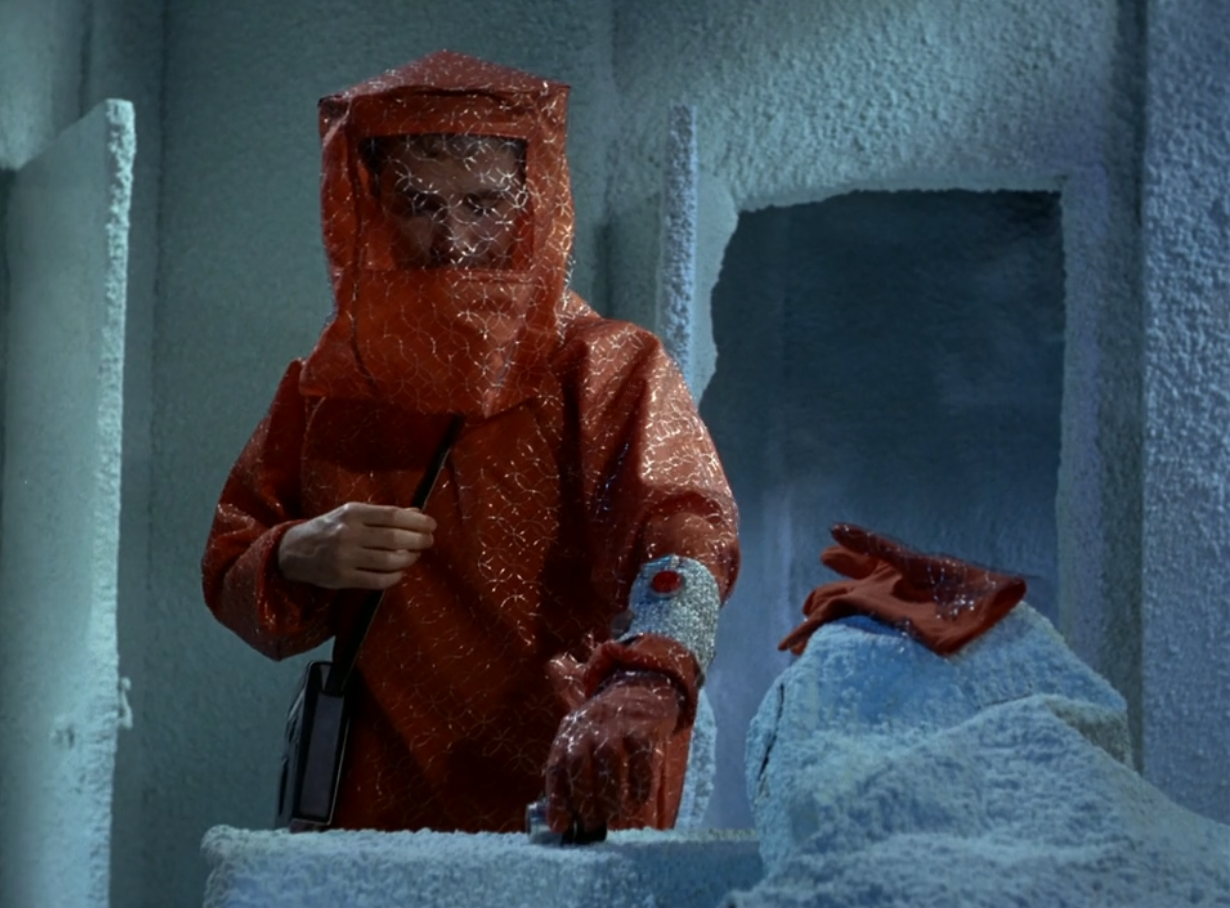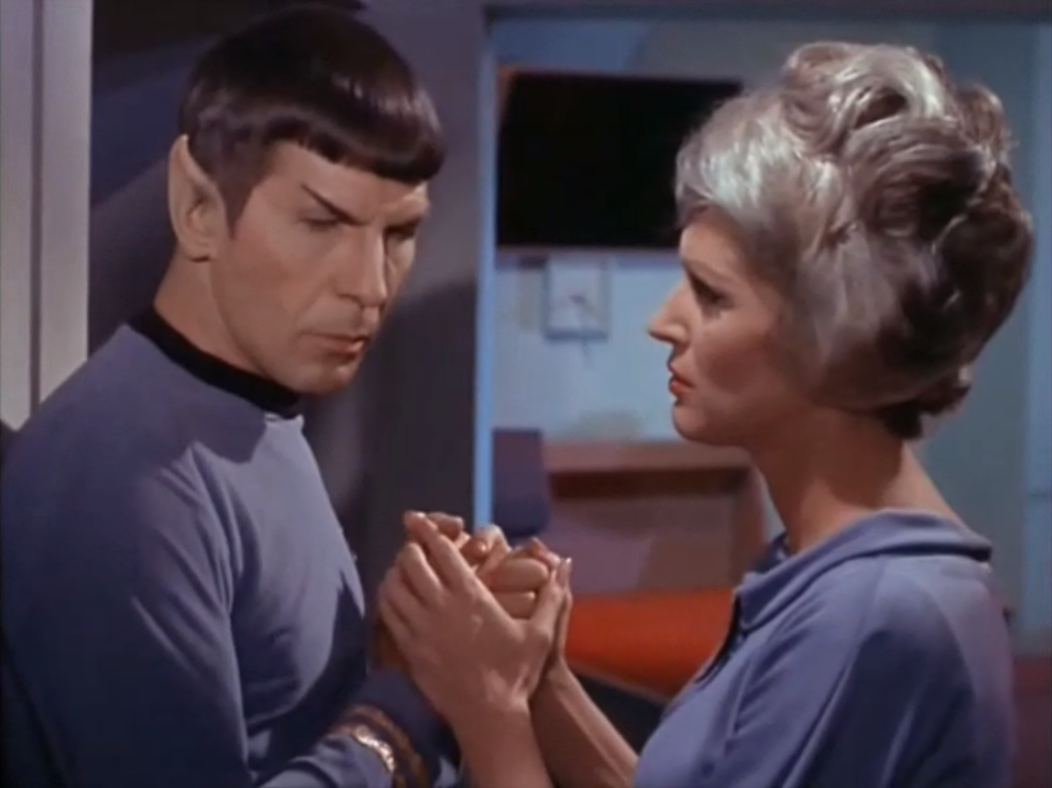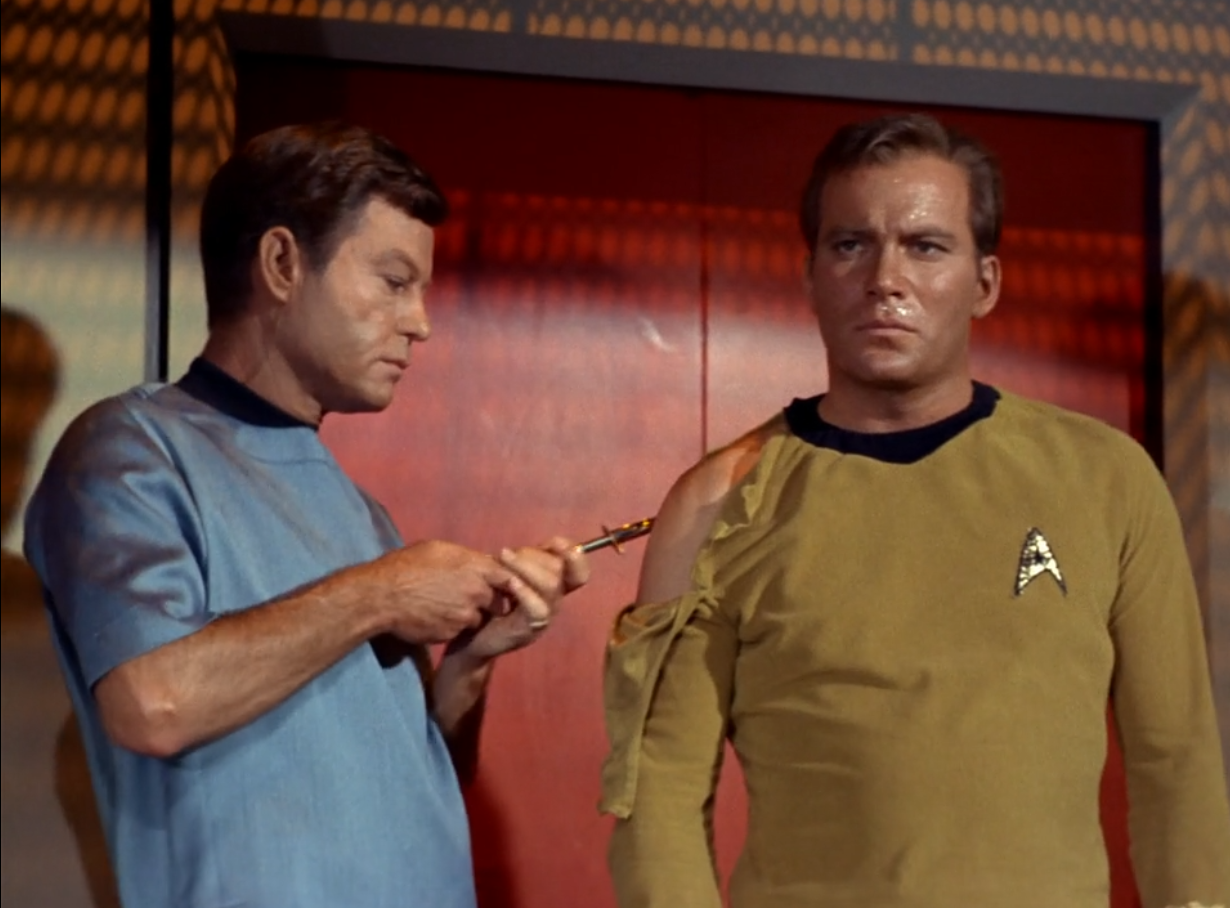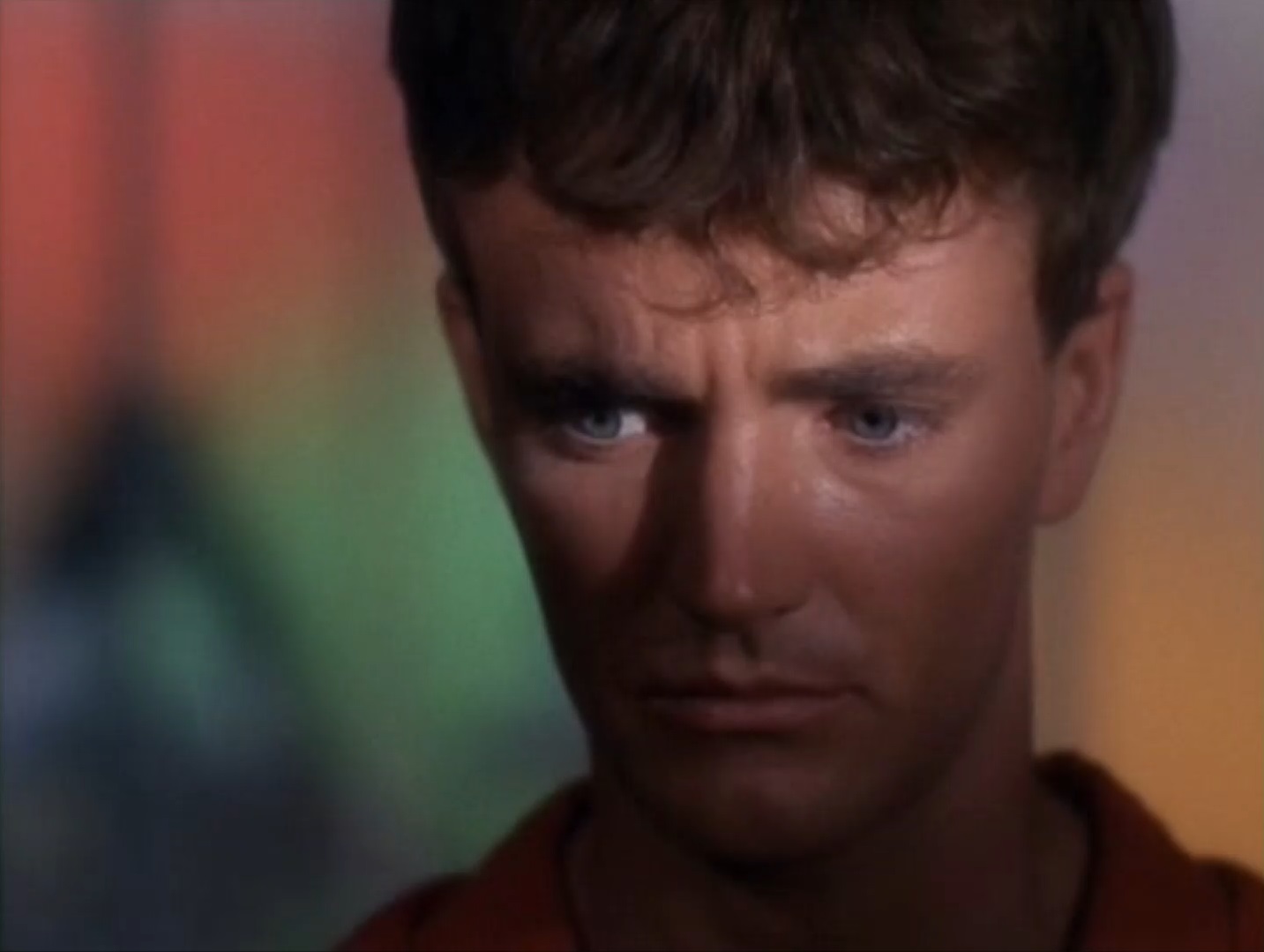
by Erica Frank
We return to our weekly adventures aboard the Enterprise, in the first episode that does not feature the dangers of psychic powers gone mad. We're still dealing with madness, of a sort — "The Naked Time" features people who have lost their self-control and run wild throughout the ship, endangering everyone on board.

The episode began with a trip to a planet on the verge of destruction; the Enterprise planned to record the event, collecting rare scientific data while avoiding being caught in its implosion. When they arrived, they found the on-planet base crew dead of mysterious causes. One bright fellow – we'll call him "Ensign Stupid" – takes off his gloves to scratch his nose while poking around the base, and he gets a scratch.

Ensign Stupid in his very fashionable orange-and-silver safety gear, completely undermining whatever protection it offered.
He catches a mysterious alien disease that eventually kills him, but first he manages to share it with several other crew members. One of them, Riley, starts singing old Irish ballads, takes over the engineering department, and locks the captain out of both control and communications. This would be funny if the ship weren't on a deadline: if the ship doesn't leave orbit before the implosion, the Enterprise will become part of the rubble.
Oh, and while that's going on, the disease is spreading: we see wild swashbuckling from Sulu, a heartfelt confession of love from Nurse Chapel, a tearful breakdown from the normally stoic Spock, and various drunken-seeming shenanigans from random crewmembers.

Nurse Chapel declares her love for Spock while clutching his hands in hers.
By the time the Captain regains control of the ship, it's too late for a safe departure; Riley's turned the warp engines completely off and they need to warm up. Scotty, the chief engineer, warns him: "I can't change the laws of physics. We've got to have thirty minutes." (They have eight minutes.) But Kirk has an idea: maybe they can jump-start them using antimatter… but for that, they need Spock sober enough to run the calculations for them.
In the end, Dr. McCoy figures out the problem – something on the planet converts water to "a complex chain of molecules" that acts like alcohol; it's transmitted through sweat. He injects people with a cure in time for Spock to manage the math for the risky maneuver; somehow, Kirk is the only person whose shirt gets torn during the vaccination.

Is this how vaccines are normally administered in the future? Or does the Federation just issue Kirk shirts with tear-away sleeves?
By the end of the episode:
We all hated Riley and his singing.
We all cheered for shirtless Sulu, even if he was being disruptive.
We were all fascinated by Spock's emotional outburst.
As usual, some details needed a bit of hand-waving to accept, but I will forgive quite a bit of "instant alien disease" and "having to remind security not to use lethal force on their crewmate" if it means I get to see dashing young men leap around with swords and without shirts.
I may start keeping a tally. Shirtless men in this episode: 1.25 (counting Kirk's torn shirt).
Five stars: the story moved fast and kept me engaged. I only noticed flaws later as I was trying to write up notes about it.
A Shocking Scene

by Janice L. Newman
This week’s episode was a departure, not only from the kinds of episodes we’ve seen from Star Trek so far, but from the kind of science fiction we’ve seen on television in general. There was no monster to fight, no human with special powers bent on taking over, no alien menace. The enemy, such as it was, came from within. (Which, coincidentally enough, sounds like next week’s episode title.)
A lot of interesting and character-revealing things happened during the show, but one moment stands out in my memory with a sharp clarity: the moment when science officer Mr. Spock, under the influence of a virus, breaks down. Although we don’t know Mr. Spock very well as a character yet, the scene was incredibly powerful. When was the last time you saw a man cry in a movie or TV show? I’m not talking about camera-friendly ‘manly’ tears when a comrade dies in a war flick, or the sniveling of a villain. I’m talking about a main character sitting down and sobbing, all while desperately trying not to.

Mr. Spock, as we learned this episode, is a half-human, half-alien person who fits into neither culture and has had to spend his whole life suppressing his emotions. He speaks of how he couldn’t tell his mother that he loved her, of his shame at his inability to control his feelings.
And yet, is this so very alien? Men are not supposed to cry, after all. Which was why it was so shocking to see Leonard Nimoy sit down and bawl onscreen, made even more compelling by his obvious struggle for control. Everyone has had that moment when they’re fighting back tears. Ironically, the ‘half-alien’ felt the most relatable and human of everyone in the episode.
It looks like I have a new favorite character. I’m looking forward to seeing more of “Mr. Spock” in future episodes.
Four and a half stars.
The Crew Stripped Bare

This episode was an emotional whirlwind. I couldn’t help but laugh as Sulu rampaged the halls, sword in hand (as fun to watch as I imagine the actor had while filming it), and be irritated by Mr. Riley’s incessant singing.
Yet these moments are juxtaposed with two exceptionally serious and jarring scenes. Lt. Tormolen, the first to contract the disease, has a breakdown in which he questions humanity’s presence in space – wondering if they are doing more bad than good – quickly spiraling into taking his own life. This scene is emotionally impactful, despite the audience’s lack of familiarity with this character (though it seems to be a common pattern, introducing a new character who dies that episode) and raises a question I wish the episode, or series overall, took time to explore:

I am in favor of scientific discovery and am thrilled by the space travel depicted in the show. Yet I can’t help but question the consequences of such a journey. While Tormolen focused mostly on its impact on humanity, I wonder about the effect on alien lifeforms. Could our common cold be potentially lethal to other species? What if we accidentally introduce an invasive species on an alien world, dramatically changing their climate and causing it to be uninhabitable for its native species? Beyond physical issues, there's the possibility of destroying an alien culture just by contacting it.
But I digress.
It’s Spock’s breakdown that stood out most about this episode and led to significant revelations about his character. He’s half-human! Up until this point, Spock’s character has been entirely defined by his alien biology. As exemplified in the episode, during a medical exam he assures the doctor that the bizarre readings are perfectly normal for his species (though you’d hope medical staff on a ship like this would be well versed in the alien biology of its occupants). While some answers are given, more questions arise. Are interspecies relationships common? And judging by Spock’s revealed shame about his mixed identity, is Spock a Vulcan outcast? That would explain how he is the only Vulcan (and alien, for that matter) among a crew of all humans.
Despite how much I enjoyed this episode I can’t help but think it came too early in the season. This episode has grand revelations for characters we are meeting for the first time (i.e. Sulu, Scott, Chapel…even Tormolen). The episode would have been more impactful had we had a chance to know these characters before their deep secrets were revealed. Spock’s breakdown would have been all the more moving had we had more than three episodes with his character beforehand.
This episode would have been the perfect season finale, rewarding long time viewers with new details about the characters they’ve come to love and setting up promising new plots to explore within the next season. Even the unexpected (to the crew and viewers alike) time jump suggested an ending. It left me with a sense of peace, the opportunity for much needed healing after a particularly trying adventure and emotions rubbed raw. I have to wonder if this episode was moved up in the schedule for some reason.
Four stars…though easily could have been five.
Questioning Boldly Going

by Jessica Dickinson Goodman
I'd like to expand on an excellent point Robin brings up. Zoom in with me for a moment on just one line from this moving episode:
Lt. Tormolen: We bring pain and trouble with us, leave men and women stuck out on freezing planets until they die. What are we doing out here in space? Good? What good? We're polluting it, destroying it. We've got no business being out here. No business.
Lt. Tormolen’s monologue begs us to question the underpinnings of the Federation. We do not currently know if his nihilistic view of space exploration is accurate, though my optimistic heart hopes it is not. But his focus on the evils of expansionism felt particularly poignant to me today as I read of Botswana declaring independence. Last week, that hilly country joined 28 other nations who have declared themselves independent from the United Kingdom since the end of the Second World War. (Lest my friends across the pond complain that I am picking on them, below are the names of each imperial power, and the number of countries who have declared independence from them since September 2, 1945: France (26), Belgium (3), Japan (2), Italy (2), Spain (1), New Zealand (1), Malaysia (1), Saudi Arabia (1), and the Netherlands (1)).

Independence ceremony for Botswana
Were there people on Psi 2000 who could have declared independence from the Federation? Did they survive great wars too, before succumbing to frost and madness? Captain Kirk calls Psi 2000 “a wasteland” and perhaps the worlds in the universe of Star Trek are often barren of locally-evolved cultures.
I hope not. I loved watching Captain Kirk treat with the Thasians as equals in Charlie X and like other reviewers, was deeply affected by the half-Vulcan Commander Spock’s breakdown. The best moments of Star Trek so far have been when the crew strives to understand the vast diversity of the universe around them using what academics might call “cultural relativism” and I might call “voracious curiosity.”
Or, to quote Nigerian author Chinua Achebe’s powerful anti-colonial novel Things Fall Apart (1958):
“The world has no end, and what is good among one people is an abomination with others.”
I hope that, in Star Trek the worlds will have no end, and we will continue to explore both the stars and our reasons for reaching for them.
Five stars.
Score One for Star Trek

by Gideon Marcus
The latest Star Trek adventure takes us where some men have been before — the crew has settled into a consistent ensemble (though the second pilot, "Where No Man has Gone Before", was shown last week and must have been bewildering to folks tuning in); the fine director of "The Man Trap", Marc Daniels, returned as well.
But we got to see new sides of many characters, particularly Spock and Sulu, to a lesser degree Kirk. We were introduced to Nurse Chapel, who has an implied depth to her history that suggests this is not her first filmed episode even if it is her first appearance.
There are pacing issues. I felt the second half of the episode was more riveting than the first. There were scientific issues, particularly the collapsing planet. The casual introduction of time travel was shocking — is Star Trek about to become Time Tunnel?

"My chronometer…it's running…backward!"
A few things stood out to me as truly superlative, though. Janice mentioned Nimoy's tour de force portraying Spock's breakdown (which Robin notes came a little too early in the season for full impact). What thoroughly impressed me was the scoring for the episode: The Irish-tinged phrases for Riley. The "disease theme", punctuated with snake rattles that indicated transmission. The entire suite from when Kirk reenters the bridge at the end, all the way to the end of the episode. I wish I'd taped it on reel-to-reel for later listening as I have with the music from Secret Agent. I'll have to do that during the summer reruns. Or perhaps they'll release a soundtrack album a la Victory at Sea.
I liked that all of the bridge crew were cross-trained. Both Uhura and Rand took the important navigation and helm stations, reinforcing that women are not just auxiliary crew in the future, but full-braid officers. I wonder if we'll see female ship captains in future episodes.
And it's a small thing, but I really appreciated the exchange between Kirk and Uhura when, tempers frayed, they snap at one another. Kirk then apologizes, and Uhura smiles in forgiveness. It was a very human, very professional interaction.

Four stars.
(P.S. Has anyone else noticed that one of the themes in this episode's soundtrack sounds a lot like a common refrain in Twelve O' Clock High? I think I heard it in "The Cage" as well.)

(Join us tonight at 8:30 PM (Pacific AND Eastern — two showings) for the next episode of Star Trek!)

![[October 6, 1966] One Trek, neat (<i>The Naked Time</i>)](https://galacticjourney.org/wp-content/uploads/2021/10/661006title-672x372.jpg)

![[September 12, 1966] Boldly Going (<i>Star Trek</i>'s "The Man Trap")](https://galacticjourney.org/wp-content/uploads/2021/09/660914title-672x372.jpg)















